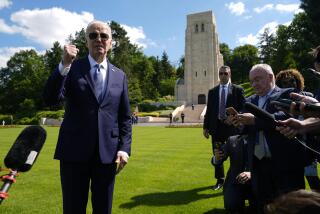At Gravesides, Clinton Salutes D-Day ‘Knights’
- Share via
CAMBRIDGE, England — President Clinton looked skyward on a sodden English morning Saturday to salute the Allied airmen who mastered the skies over Europe in World War II at a grievous cost in lives.
Speaking in a steady drizzle before a field of crosses at the Cambridge American Cemetery and Memorial, Clinton honored the pilots, bombardiers and ground crews who “walk among us or lie among us today.”
Clinton called the airmen “knights borne on wings” and said they helped turn the tide of the war and made possible the D-day landings that he has journeyed to Europe to commemorate.
The lush Cambridge cemetery holds the graves of 3,812 Americans and memorializes more than 5,000 others officially listed as missing in action.
Among the names enshrined on the Wall of the Missing are those of bandleader-turned-airman Glenn Miller, whose flight vanished in 1944, and Joseph P. Kennedy Jr., the older brother of President John F. Kennedy. Joseph Kennedy was a Navy pilot killed when his plane blew up during a special bombing mission.
“America gave to England an infusion of arms and men and materiel,” Clinton said. “The British gave our troops the feeling that they were not so far from home after all. The British gave us inspiration; the Americans gave, in return, hope. At every level, Yanks and Brits worked together like family.”
England was the second stop of Clinton’s three-nation trip to commemorate D-day. The President earlier visited Italy and is to cross the English Channel to France today.
Unlike the somber and restrained memorial event at the American cemetery at Nettuno, Italy, on Friday, Saturday’s commemorative events had an almost festive feel. An Air Force ensemble entertained the guests with Miller swing standards such as “Moonlight Serenade,” “In the Mood” and “St. Louis Blues March.”
White House officials and politicians worked the crowd before Clinton and British Prime Minister John Major spoke. The ceremony ended with a flyover by vintage aircraft, including a lumbering B-17 bomber as well as a British Spitfire and an American P-51 Mustang zooming through acrobatic maneuvers.
As they left the memorial service, Clinton and Major walked among guests, shaking hands and posing for pictures.
In his remarks, Major spoke of the “invasion” of England by GIs preparing for the landings on the Continent. He noted that, just before D-day, more than 1.5 million soldiers and airmen were based on British soil under Supreme Allied Commander Dwight D. Eisenhower.
“For a while,” Major said, “every 30th person in Britain was an American serviceman.” And he recalled the sacrifice they made to free Europe from tyranny--150,000 lives in the European theater, including 57,000 airmen.
“We remember today why those lives were given. Those who came here from America were not, as we were, protecting their homes and families,” Major said. “They didn’t come here for national glory, not for profit, not for material gain.
“They came, many of you here today came, above all, to defend the values which Britons and Americans hold sacred: to defend freedom and democracy, justice and human rights,” the prime minister said.
Perhaps the most affecting remarks of the day came from a former B-24 bomber pilot who flew 35 missions over Nazi-held territory, including the vital Ploesti oil fields in Romania.
The pilot--73-year-old Treasury Secretary Lloyd Bentsen--said that during the war “boys grew into men far too fast.”
He recalled the daily routine of the flight crews: “Scared? Of course. Anyone who wasn’t was either a fool or didn’t have any imagination. . . . Numbing fatigue. Faceless danger. Fiery death. Those were an airman’s constant companions. In the face of this, these men not only flew and fought, they soared and triumphed.”
Clinton and Major met privately afterward at Chequers, the prime minister’s country house near Oxford. The two leaders said they discussed Bosnia-Herzegovina and agreed that they will continue to press all sides to settle the territorial issues still in dispute.
Major said that continued fighting would yield no significant territorial gains and would only “continue to strain international patience.”
Neither he nor Clinton said what they are prepared to do about the 2-year-old civil war in the former Yugoslav republic if their patience actually runs out.
From Chequers, Clinton traveled by motorcade to a hotel 15 minutes away for a brief courtesy call on Margaret Beckett, the acting leader of Britain’s opposition Labor Party. She assumed the leadership of the party last month after the sudden death of party leader John Smith.
Later, Clinton attended an elaborate garden party and a formal dinner hosted by Queen Elizabeth II in the English Channel city of Portsmouth, one of the chief jumping-off points for invasion forces.
The entertainment included U.S. Air Force personnel dancing the Lindy Hop and British sailors in a rigging and climbing exhibition.
It was at times difficult, amid all the distractions, to remember the solemnity of the occasion that thousands were gathered to commemorate.
The queen, in a rare speech at the black-tie dinner for visiting dignitaries, reminded her guests of the sacrifice of those who fought for liberation.
“Many veterans will be in Normandy themselves, retracing their steps up the beaches and beyond, amidst altered landmarks. Others will prefer to remember quietly their comrades who fell that day,” the queen said. “For, lest we forget, there were some 10,000 casualties on D-day itself.”
She said that today’s generations must keep faith with those who landed on the beaches and those who prayed for their success.
“It is up to us to make sure that the prayers of 50 years ago are truly answered, by rededicating ourselves to the creation of a world at peace,” the queen said.
More to Read
Sign up for Essential California
The most important California stories and recommendations in your inbox every morning.
You may occasionally receive promotional content from the Los Angeles Times.










